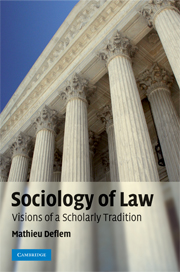Book contents
- Frontmatter
- Contents
- Preface and acknowledgements
- Introduction: sociology, society, law
- Part I Theoretical foundations of the sociology of law
- Part II Development and variations of the sociology of law
- Part III Sociological dimensions of law
- 7 Law and economy: the regulation of the market
- 8 Law and politics: the role of democratic law
- 9 Law and integration: the legal profession
- 10 Law and culture: the balance of values through norms
- Part IV Special problems of law
- Conclusion: Visions of the sociology of law
- Bibliography
- Index
7 - Law and economy: the regulation of the market
Published online by Cambridge University Press: 05 June 2012
- Frontmatter
- Contents
- Preface and acknowledgements
- Introduction: sociology, society, law
- Part I Theoretical foundations of the sociology of law
- Part II Development and variations of the sociology of law
- Part III Sociological dimensions of law
- 7 Law and economy: the regulation of the market
- 8 Law and politics: the role of democratic law
- 9 Law and integration: the legal profession
- 10 Law and culture: the balance of values through norms
- Part IV Special problems of law
- Conclusion: Visions of the sociology of law
- Bibliography
- Index
Summary
Relying on the analytical approach that was introduced in the Introduction, the following four chapters of this book focus on the interdependent relations that exist between law and other societal institutions and functions, specifically between law and economy, law and politics, law and normative integration, and law and culture. As mentioned before, this perspective is indebted to the systems theory of Talcott Parsons, yet the model is here used in a strict analytical manner to open up multiple research questions that can be approached from a variety of theoretical positions.
In the specification of the employed analytical model in this book, important theoretical positions can be differentiated that have moved sociology on at least three different levels. First, the suggested analytical model of society corresponds to the social sciences of economics, political science, sociology, and (cultural) anthropology. Among these disciplines, the role of sociology has historically been unique because of its focus on integration as an important function for society as a whole without restricting attention to any one of society's constituent parts alone (see Habermas 1981b: 4–5). Second, the model can also be read in terms of the sociological specialty areas of economic sociology, political sociology, sociology of law, and cultural sociology. What separates these specialty fields from the social sciences that specialize in their corresponding institutional areas is that they share and hold on to a sociological attention to society as a whole.
- Type
- Chapter
- Information
- Sociology of LawVisions of a Scholarly Tradition, pp. 145 - 161Publisher: Cambridge University PressPrint publication year: 2008



